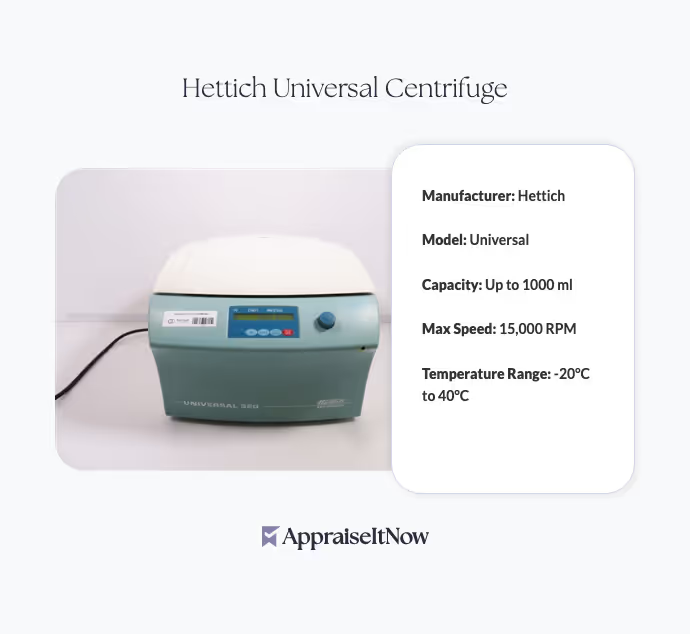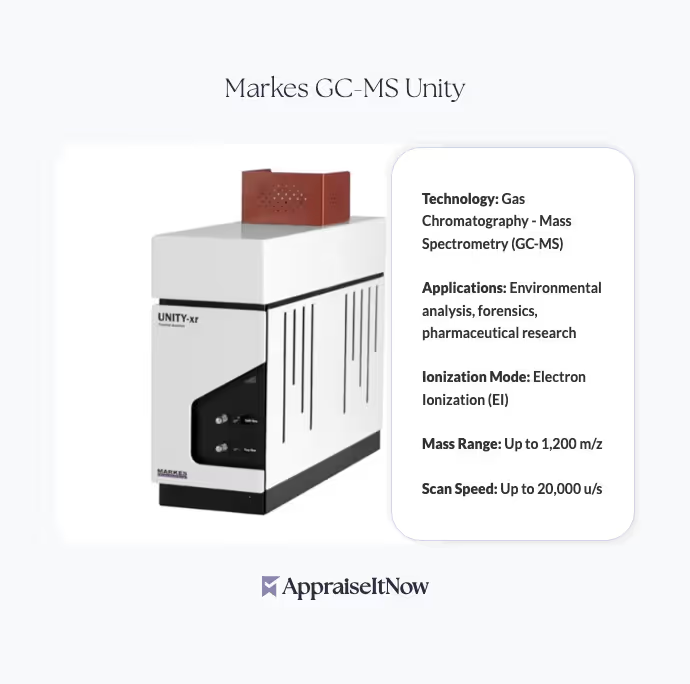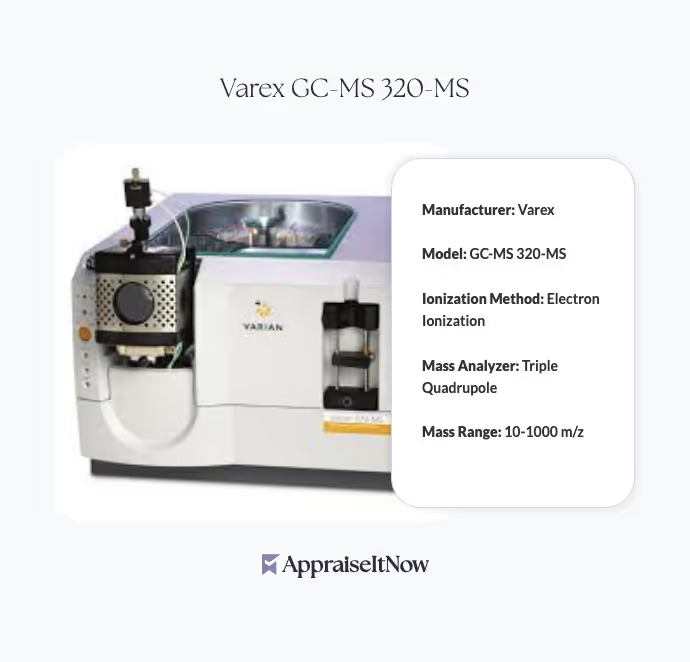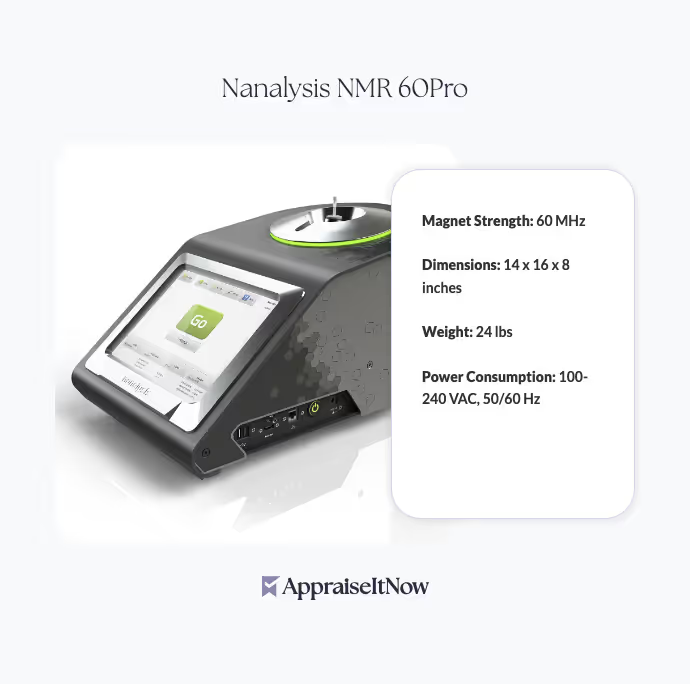<h1>How to Get Your Hettich Universal Centrifuge Appraised</h1>
<p>The Hettich Universal Centrifuge stands as one of the most trusted laboratory instruments in research facilities worldwide. Whether you're upgrading your lab equipment, planning an estate liquidation, or securing insurance coverage, understanding how to properly appraise your centrifuge ensures you capture its true market value. These precision instruments typically fall within the <strong>$30,000 to $40,000 range</strong>, but numerous factors influence your specific unit's worth.</p>
<h2>Understanding Hettich Centrifuge Value Fundamentals</h2>
<p>The Hettich Universal Centrifuge has earned its reputation since its introduction in 1947, commanding respect from leading research laboratories across biology, chemistry, and medicine. Your centrifuge's value stems directly from its advanced engineering, versatile capabilities, and the critical role these instruments play in modern scientific research. When evaluating your equipment, you're essentially assessing a specialized <a href="/types/lab-equipment">lab equipment</a> investment that serves essential functions in separating mixtures based on density through precise rotational control.</p>
<p>What makes your Hettich particularly valuable? The combination of programmable controls, temperature regulation capabilities, and durable construction means it performs reliably across diverse research applications. The certification for use with biohazardous samples adds another layer of importance—this specialized capability makes it indispensable for clinical and research laboratories handling sensitive biological materials.</p>
<div class="callout tip"><p><strong>Appraiser Insight</strong></p>
<p>Units with documented biohazard certification and maintenance records typically command 15-20% premiums over standard models due to verified compliance and operating history.</p></div>
<h2>Key Specifications That Drive Appraisal Value</h2>
<p>Your Hettich Universal's market value directly reflects its technical capabilities and condition. Understanding what appraisers examine helps you prepare for the valuation process and identify factors that might enhance or diminish your unit's worth.</p>
<p>The centrifuge's programmable timers and speed controls represent significant advances in laboratory automation. Unlike older manual models, your Universal's ability to handle wide-ranging sample sizes—from microliters to full bottles—means it serves multiple research functions simultaneously. This versatility directly translates to market demand and resale value, similar to how <a href="/types/equipment-and-machinery">equipment and machinery</a> valuations account for functional flexibility.</p>
<p>Temperature regulation stands out as another premium feature. Maintaining precise thermal conditions during separation proves critical for temperature-sensitive samples, whether you're working with proteins, blood components, or cellular materials. When considering how to balance samples in your centrifuge or optimizing separation protocols, these temperature management systems become indispensable for reproducible results.</p>
<p>The distinction between RCF (Relative Centrifugal Force) and G-force—essentially interchangeable terms in centrifuge specifications—appears throughout technical documentation. Understanding that RCF and G are the same measurement helps you accurately assess your unit's performance specifications during appraisal discussions. Similarly, knowing how to calculate centrifuge capacity based on your rotor configuration allows you to speak knowledgeably with appraisers about your equipment's full potential.</p>
<h2>Condition Assessment and Current Market Valuation</h2>
<p>Professional appraisals evaluate your Hettich Universal across multiple dimensions. Beyond the baseline <strong>$30,000-$40,000 estimate</strong>, individual units within this range depending heavily on operational history, maintenance records, and cosmetic condition.</p>
<p>A centrifuge maintained by certified technicians with documented service records commands premium pricing. When was your unit manufactured? The 1947 introduction year means some surviving examples have remarkable longevity, with properly maintained units continuing to function reliably decades later. However, newer models with upgraded electronics and features may actually command higher absolute values than vintage examples, even as the older units demonstrate the engineering excellence Hettich built into their design.</p>
<p>Cosmetic condition matters less for laboratory equipment than operational reliability. A unit with cosmetic wear but pristine internals will appraise higher than a polished-looking centrifuge with questionable mechanical history. Appraisers specifically examine rotor condition, motor function, and seal integrity—the components most critical to safe, accurate operation.</p>
<div class="callout note"><p><strong>Valuation Factor</strong></p>
<p>Units with original paperwork, calibration certificates, and maintenance logs typically appraise at the higher end of the $30,000-$40,000 range due to verified operational history.</p></div>
<h2>Specialized Features and Their Impact</h2>
<p>The versatility that makes your Hettich Universal valuable also complicates straightforward appraisal. Your unit's specific rotor configuration, maximum RPM capacity, and specialized features all factor into precise valuation. The question of how many RPM produces 300g force—or conversely, what does 10,000g mean in centrifuge operations—gets resolved through your unit's technical specifications and capabilities.</p>
<p>Corrosion-resistant construction proves particularly valuable for laboratories handling biohazardous or corrosive samples. Stainless steel components and protective coatings extend operational life and maintain reliability over decades. This durability consideration applies whether you're appraising your own unit or evaluating purchases—the better-built instruments maintain value through extended use.</p>
<h2>Choosing the Right Appraiser for Your Equipment</h2>
<p>Appraising a Hettich Universal Centrifuge requires specialists who understand both general <a href="/types/medical-equipment">medical equipment</a> valuations and the specific nuances of laboratory instruments. Your appraiser should possess detailed knowledge of centrifuge technology, safety standards, and current market demand among research institutions and clinical laboratories.</p>
<p>Look for appraisers with experience in laboratory equipment valuation. They should understand the technical differences between centrifuge types and be able to assess condition beyond obvious visual inspection. For valuable equipment like yours, certified appraisers holding credentials from recognized organizations ensure USPAP-compliant documentation suitable for insurance, sale, or estate purposes.</p>
<p>Professional appraisers can guide you through the distinction between fair market value and replacement cost value. Fair market value represents what a willing buyer would pay a willing seller, while replacement cost reflects what you'd spend to purchase comparable new equipment. Understanding which valuation approach applies to your specific situation—whether for insurance, tax purposes, or sale—ensures you receive appropriate documentation.</p>
<div class="callout tip"><p><strong>Selection Insight</strong></p>
<p>Appraisers who specialize in high-throughput laboratory equipment and understand biohazard-certified systems typically provide the most accurate valuations for your Hettich Universal.</p></div>
<h2>Documentation and Preparation for Appraisal</h2>
<p>Before scheduling your appraisal, compile whatever documentation exists for your centrifuge. Original purchase receipts, maintenance records, and calibration certificates substantially strengthen both your appraisal value and your confidence in the results. Even if paperwork is incomplete, photographs from multiple angles and records of recent service work help appraisers establish accurate valuations.</p>
<p>When preparing your centrifuge for appraisal, ensure it's clean and accessible. If your unit hasn't operated recently, consider having a qualified technician perform basic checks to confirm mechanical functionality. Safety considerations around properly balanced and secure centrifuge operation become relevant during appraisal inspections—demonstrating responsible equipment maintenance enhances value perception.</p>
<p>Thinking through how to balance five samples in a centrifuge or other operational questions during your appraisal conversation shows you understand and maintain your equipment properly. This operational knowledge indirectly validates condition claims and maintenance history.</p>
<h2>Market Dynamics and Timing Considerations</h2>
<p>The laboratory equipment market remains relatively stable, with Hettich instruments maintaining consistent demand among research institutions, clinical laboratories, and educational facilities. Unlike some equipment categories that fluctuate dramatically with technological obsolescence, well-maintained centrifuges retain value reliably because the fundamental physics of separation remains constant.</p>
<p>Your equipment's specialized certification for biohazardous sample handling adds stability to valuations. Laboratories cannot easily switch to unverified equipment when handling sensitive biological materials, creating persistent demand for certified, well-documented instruments. This institutional requirement supports consistent pricing within the $30,000-$40,000 range regardless of broader economic conditions.</p>
<p>Whether you're appraising your centrifuge for insurance purposes, planning equipment sales, or managing estate valuations, understanding current market conditions helps set realistic expectations. The question "Which company makes the best centrifuge?" has earned Hettich substantial credibility over decades, and that reputation translates directly to market value.</p>
<h2>Why Professional Appraisal Matters for Your Centrifuge</h2>
<p>Attempting to value a Hettich Universal Centrifuge without professional expertise often leads to significant errors in either direction. Overestimating value can create problems if you're using the appraisal for insurance—you may pay inflated premiums for overstated coverage. Underestimating exposes you to inadequate insurance and lost value if you eventually sell the equipment.</p>
<p>Professional appraisal provides the documentation necessary for insurance companies, courts, and financial institutions. Whether you're settling an estate, facilitating a business sale, or acquiring insurance coverage for valuable laboratory equipment, certified appraisals from credentialed experts ensure your documentation meets professional standards and withstands scrutiny.</p>
<p>You'll appreciate how AppraiseItNow connects you with specialists in <a href="/types/chemical-equipment">chemical equipment</a> and laboratory instruments who understand the specific requirements for valuing sophisticated equipment like your centrifuge. Our USPAP-compliant appraisals include detailed condition assessments, market analysis, and comprehensive documentation suitable for any professional purpose.</p>
<div class="callout note"><p><strong>Key Takeaway</strong></p>
<p>A certified appraisal of your Hettich Universal Centrifuge provides accurate valuation within the $30,000-$40,000 range, comprehensive documentation for insurance or sale purposes, and confidence that your valuable laboratory equipment is properly understood and protected in today's market.</p></div>
















